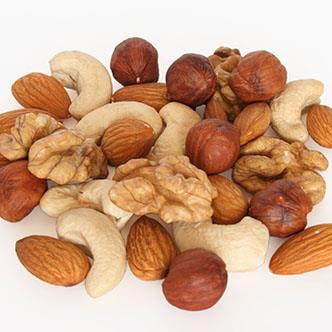
Consuming five or more servings of nuts a week may reduce risk of heart disease and death, based on a study of more than 16,000 adults with diabetes whose health was followed for more than three decades.
Published in the American Heart Association journal Circulation Research, this study looked at the health benefits of nut consumption in patients with type 2 diabetes. Type 2 diabetes is the most common form of diabetes, currently affecting nearly 28 million U.S. adults. It occurs when the body doesn’t use insulin properly and is a known risk factor for heart disease—the No. 1 killer of American adults.
Fortunately, type 2 diabetes can be prevented and managed with a healthy diet. Based on recent findings, nuts may be an important way for patients with diabetes to improve their health.
This study analyzed data from the Nurses’ Health Study and Health Professionals Follow-Up Study, which tracked the health of U.S. health workers from the 1980s through 2014. The analysis included 16,217 participants who had diabetes or developed diabetes during the study period.
Participants completed a dietary survey every 2–4 years, which included detailed questions about nut consumption. Participants’ health was tracked by medical records and national death records through 2014.
By the end of the study, 3,336 participants had developed heart disease. There were 5,682 deaths. After analysis, researchers found that higher total nut consumption was associated with lower risk of heart disease and death.
Compared to adults who consumed less than one serving of nuts a month, those consuming five or more servings a week had 17% lower risk for heart disease and up to 34% lower risk of death.
One serving was defined as 28 grams, which is equivalent to about a handful of nuts.
When researchers looked at peanuts vs. tree nuts like almonds and walnuts, they found that tree nuts had a stronger impact on outcomes compared to peanuts. However, higher peanut consumption was still associated with lower risk of death compared to low peanut consumption.
Researchers also found that among participants diagnosed with diabetes, those who increased their nut consumption after their diagnosis had 15% lower risk of heart disease and 27% lower risk of death than those who did not change their diet.
The take-home message, according to authors, is that regular nut consumption may have significant benefits for patients with diabetes. Authors also note that tree nuts like almonds, walnuts and hazelnuts may be particularly beneficial. For patients newly diagnosed with diabetes, making a point to increase nut consumption may be one way to help improve outcomes.
Additional research is needed to better understand the specific benefits of nut consumption in patients with diabetes. However, research continues to show that regular nut consumption has a number of heart-health benefits. These benefits may be especially meaningful in patients with diabetes, who face significantly increased risk for heart disease.